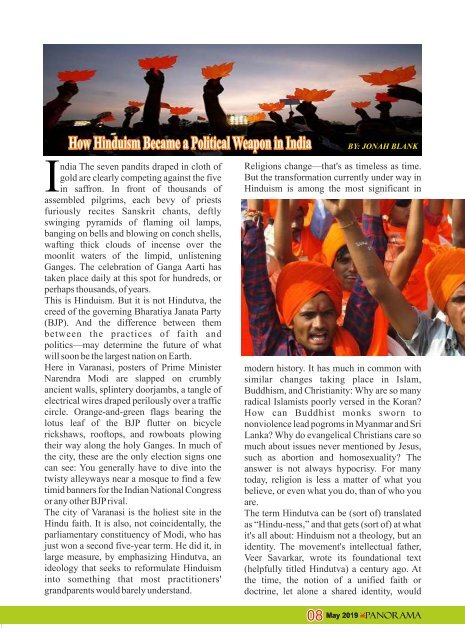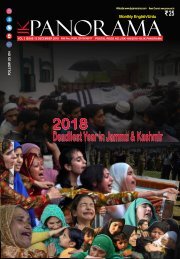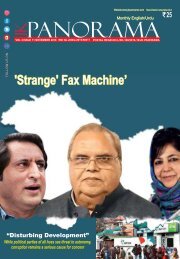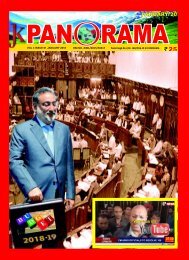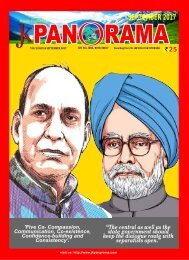Create successful ePaper yourself
Turn your PDF publications into a flip-book with our unique Google optimized e-Paper software.
How Hinduism Became a Political Weapon in India<br />
India The seven pandits draped in cloth of<br />
gold are clearly competing against the five<br />
in saffron. In front of thousands of<br />
assembled pilgrims, each bevy of priests<br />
furiously recites Sanskrit chants, deftly<br />
swinging pyramids of flaming oil lamps,<br />
banging on bells and blowing on conch shells,<br />
wafting thick clouds of incense over the<br />
moonlit waters of the limpid, unlistening<br />
Ganges. The celebration of Ganga Aarti has<br />
taken place daily at this spot for hundreds, or<br />
perhaps thousands, of years.<br />
This is Hinduism. But it is not Hindutva, the<br />
creed of the governing Bharatiya Janata Party<br />
(BJP). And the difference between them<br />
between the practices of faith and<br />
politics—may determine the future of what<br />
will soon be the largest nation on Earth.<br />
Here in Varanasi, posters of Prime Minister<br />
Narendra Modi are slapped on crumbly<br />
ancient walls, splintery doorjambs, a tangle of<br />
electrical wires draped perilously over a traffic<br />
circle. Orange-and-green flags bearing the<br />
lotus leaf of the BJP flutter on bicycle<br />
rickshaws, rooftops, and rowboats plowing<br />
their way along the holy Ganges. In much of<br />
the city, these are the only election signs one<br />
can see: You generally have to dive into the<br />
twisty alleyways near a mosque to find a few<br />
timid banners for the Indian National Congress<br />
or any other BJP rival.<br />
The city of Varanasi is the holiest site in the<br />
Hindu faith. It is also, not coincidentally, the<br />
parliamentary constituency of Modi, who has<br />
just won a second five-year term. He did it, in<br />
large measure, by emphasizing Hindutva, an<br />
ideology that seeks to reformulate Hinduism<br />
into something that most practitioners'<br />
grandparents would barely understand.<br />
BY: JONAH BLANK<br />
Religions change—that's as timeless as time.<br />
But the transformation currently under way in<br />
Hinduism is among the most significant in<br />
modern history. It has much in common with<br />
similar changes taking place in Islam,<br />
Buddhism, and Christianity: Why are so many<br />
radical Islamists poorly versed in the Koran?<br />
How can Buddhist monks sworn to<br />
nonviolence lead pogroms in Myanmar and Sri<br />
Lanka? Why do evangelical Christians care so<br />
much about issues never mentioned by Jesus,<br />
such as abortion and homosexuality? The<br />
answer is not always hypocrisy. For many<br />
today, religion is less a matter of what you<br />
believe, or even what you do, than of who you<br />
are.<br />
The term Hindutva can be (sort of) translated<br />
as “Hindu-ness,” and that gets (sort of) at what<br />
it's all about: Hinduism not a theology, but an<br />
identity. The movement's intellectual father,<br />
Veer Savarkar, wrote its foundational text<br />
(helpfully titled Hindutva) a century ago. At<br />
the time, the notion of a unified faith or<br />
doctrine, let alone a shared identity, would<br />
08 May 2019


